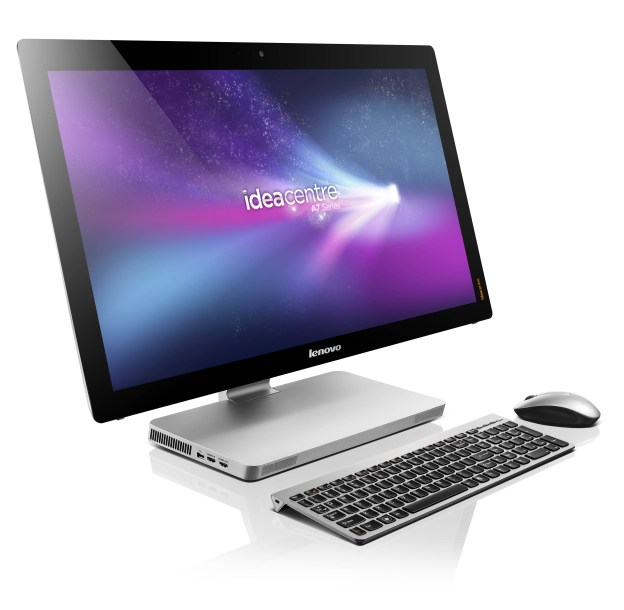
We reviewed the Lenovo IdeaCentre A720 late last year. It was a beautiful machine dragged down by poor value compared to competitors like the Dell XPS One and even the iMac.
Lenovo pulled the A720 from its website not long after release and listed it as “temporarily unavailable,” saying that it’d be back on store shelves soon with Windows 8 and a touchscreen. These changes may give it a second chance with consumers.
The new model is in many ways the same as the original, so we didn’t feel a full review was warranted. However, we did want to take another look at the system to see if adding touch is enough to make the system stand out.
A slightly lower price, a slightly slower processor
Our review unit arrived with a price tag of $1,599. That’s $100 less than the model we previously reviewed, but the new unit came with a Core i5-3210M instead of the Core i7-3610M found in the previous PC.
The slower processor lowered the system’s 7-Zip score from 18,607 to 8,177 and reduced its SiSoft Sandra Processor Arithmetic score from 88.51 GOPS to 45.4 GOPS. Other performance figures haven’t significantly changed. The system came equipped with the same Nvidia 630M graphics processor and mechanical hard drive as the model we previously reviewed.
A sizable performance gap may seem a poor trade for $100, but it’s important to remember that our benchmark tests are highly optimized and show quad-core processors like the Core i7-3610M in the best possible light. In normal use, the Core i5 doesn’t feel slower.
Don’t forget the touchscreen. Most competitors charge $150 to $250 for this option, which will put them at or near this system’s $1,599 MSRP.
Still lacking in resolution
All versions of this all-in-one ship with a 1080p display. Unfortunately, that isn’t enough pixels to make a 27-inch monitor look sharp. Competitors like Apple and Dell have figured this out and provide a resolution of 2560 x 1440 on their 27-inch models. Not correcting this flaw with the refresh is a missed opportunity for Lenovo.
Image quality is lacking as well. Test results were middling and banding was visible in many images including the default Windows 8 background. Every other all-in-one of similar price and/or size is superior in this area.
Still a beauty
Still, we can’t help but admire the design of this PC. Its elegant, slim exterior is primarily constructed of metal, putting it a step above the silver plastics used by Dell and HP. While the HP Spectre One does an even better job of hiding its hardware, the A720 remains more attractive and feels more robust. The engineers responsible for this system deserve a promotion.
We also like the controls. Our previous review unit, like this one, used touch-sensitive controls to handle volume and display settings. Adding a touchscreen to the system makes these controls feel even more intuitive than before. It’s on par with the Dell XPS One and far better than the HP Spectre One’s finicky software controls.
Even the peripherals are decent. The mouse is basic but sturdy and the keyboard is a desktop rendition of the superb AccuType keyboards that dominate Lenovo’s laptop line. Most users will have no need for an upgrade.
Does touch save the day?
Aesthetics aside, our previous review couldn’t find a reason to recommend this system over Dell’s quicker and less expensive XPS One. Has that changed?
No, it hasn’t. Dell has also added touch to its XPS One and is selling it for an identical $1,599. That price buys a Core i5-3330s processor and an incredible 2560 x 1440 display. Lenovo’s alternative is superior only in graphics (the entry-level Dell ships with Intel integrated), though that’s no real advantage. Both systems are bad at gaming.
The A720 Touch offers class-leading design. It does not, however, offer a competitive display or a particularly quick processor. These serious flaws continue to mar the beauty of this all-in-one, making it impossible for us to recommend it over Dell’s XPS One or the Apple iMac.


